Tim was kind enough to spend an evening answering questions about his collages, his writing and the art of living a creative life.

Zen Dixie: Did you start out as a visual artist who ended up writing novels or is this something that you came to enjoy later in life?
Tim Lukeman: Well, I remember drawing and writing when I was 5 years old. The pictures often had a story to go with them, in that I'd start drawing on the left side of the paper, and the story would develop as I went to the right side.
At the same time, I was reading at 5, and fascinated with storytelling even then. C. S. Lewis has written about his childhood love of books -- not simply the stories, but their physical being -- the binding, the indicia, etc. I was like that myself.
I'd write little "novels" (all of 4 or 5 handwritten pages), then make a cover, a library card & pocket for the back cover, and everything a "real" book required.
Zen Dixie: Even the library packet? You had a clear vision of what you were going to do even then. Where there any artists or illustrators who made an impression on you as a child?
Tim Lukeman: I can't remember too many specific writers or illustrators from that early. I was fascinated by stories of myth, of foreign customs and different ways of life, of anything especially imaginative. One of my treasured childhood books was a very old children's volume of Norse myth. In fact, myths of all lands attracted me from the start. I discovered science-fiction at that time, and read all the classic authors of the 1930s through the early 1960s
My father was in the Army, and we were uprooted every year and a half, it seemed. This had a powerful effect on me in a couple of ways. First, it made me realize first-hand that not everyone in the world was an American, that other people spoke different languages, believed different things, lived different lives. This was a valuable lesson, as you can imagine!
Secondly, as an introverted boy, it always took me longer than most children to adjust to each no location around the world. I tended to cling to familiar things, my books being among them. And I was delighted to learn that one thing I could always count on being familiar was the local library -- the Dewey decimal system was my friend! No matter how different the surroundings, I could always count on the library being organized & laid out the same way everywhere. Again, this reinforced my love of books & storytelling in general.
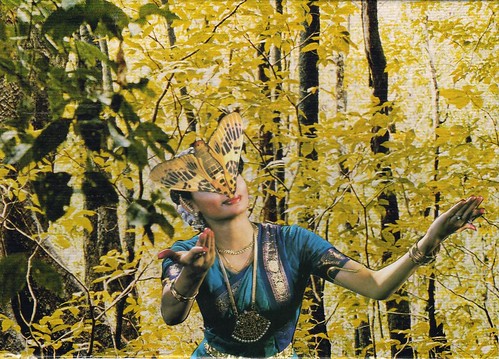
So, up through 7th or 8th grade, I concentrated both on drawing & writing. My first real story was lost in moves decades ago, but I remember it very well. In fact it encapsulated my creative interests & approach even then. It was called 'The Little Toy Alligator Who Ran Away From Home," complete with an illustration of the alligator.
Zen Dixie: Kind of like "The Brave Little Toaster"?
Tim Lukeman: The story: an old toymaker had made a toy alligator, his favorite of all his creations. The toy alligator was curious about the world beyond the toyshop & ran away from home to see what was out there. After wandering for awhile, he joined the circus & became a big star. Meanwhile, the toymaker was saddened & heartbroken. So one day he decided to go to the circus, hoping to cheer himself up. Lo & behold, there was the toy alligator! A happy reunion followed, and all was well ever after.
Zen Dixie: Aw, that sounds pretty neat! And you were in first grade or so when you wrote it?
Tim Lukeman: First or second, if I remember correctly. The idea of some thing fantastic, of the unreal being accepted as real, the joy of creation, the urge to see & learn new things, the pain of loss -- all themes in my work to this day.
About the time I entered high school, many things changed. My father retired from the Army, so no more moving around. Because I had started school overseas, where children could start at a younger age than in the States, I was about a year, year and a half younger than my classmates. That hadn't mattered so much before, but in high school, with puberty hitting, and a few months seeming like decades, well...
Zen Dixie:That must have complicated things. Did you find any kind of community with other creative students? Was there a teacher or adult who made an impression and was supportive?
Tim Lukeman:Well, I was lucky in that all of my English teachers recognized my introversion AND my love of literature, and encouraged me. My 9th grade homeroom teacher, later my 11th grade English teacher, noticed the sort of books I enjoyed & lent me his Ace paperback copy of "The Fellowship of the Ring." That did it! It also helped that my high school years were from 1967 to 1971, right at the height of the 1960s, when imagination & flights of fancy were a good thing (to put it mildly).
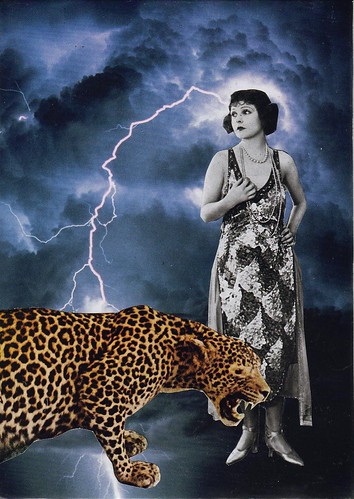
Zen Dixie: an excellent time to be a sci-fi fantasy fan!
Tim Lukeman: Yes, Ballantine had begun their Adult Fantasy Series & was reprinting dozens of classic books, before fantasy became a formulaic, mass-market genre.
I really immersed myself in the world of the imagination, in order to cope with major introversion. At the same time, I made a decision, not entirely consciously, to focus on writing instead of art, since I seemed better at it, and thought I could only do one thing well, not many at the same time.
Zen Dixie:I know you're still pursuing both types of expression. It makes me wonder: Are you the kind of creative person who revisits and rewrites/recreates past work or do you see everything as completed and tend to continually move forward?
Tim Lukeman: Ah, that's a good question. Now, as to revisiting past projects... Like any aspiring writer, I've got plenty of unfinished novels. I wouldn't be averse to mining them for some ideas & good invented names; but otherwise, I've generally been eager to keep trying new things.
However, I've been creating long enough to recognize certain themes & motifs that occur again & again in whatever I'm doing -- ideas that have intense emotional power for me, and inspire me far more than most other ideas. I can see very clearly how they took root in my psyche, too.
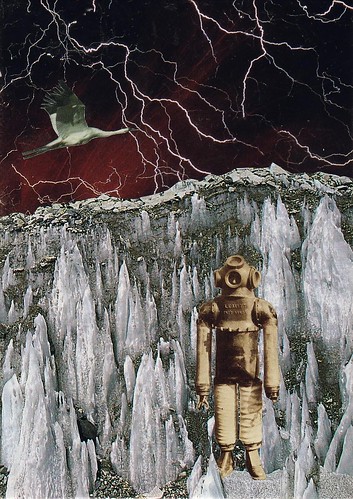
Zen Dixie: Do you see these concepts in canonical mythic terms or is there a sort of person arcana of archetypes and ideas that you work with?
Tim Lukeman: It's definitely a personal arcana, even when derived from more traditional forms. I can briefly outline the exact progression & development of that personal mythology, in fact.
"Lord of the Rings" made me want to read all things Tolkien, and anything remotely like him. At the time, of course, fantasy stories were few & far between. But Reading about Tolkien led me to Medieval literature, and a renewed interest in the Norse myths.. We were also reading "The Iliad" and "The Odyssey" for English. Those influences led me to read every piece of classical literature in the school library such as the Greek poets & playwrights, the Medieval classics, and so forth.
This in turn led me to works such as Dante's "Divine Comedy," and more modern poets' take on mythic material. I discovered Willima Blake & was overwhelmed by his long prophetic poems, as well as the fusion of art & poetry in his work. I couldn't understand or cope with it then, but I instantly saw that at its heart, it was the same territory that both Tolkien & Homer were exploring. It didn't take long to stumble onto the psychologist Carl Jung from that point, as his name came up in quite a few books about such literary works.
Zen Dixie: It's easy to see Jung's influence in some of your collage work.
Tim Lukeman: Yes, Jung remains a major influence on my worldview -- not dogmatically so, recalling Jung's own statement, "Thank God I am Jung, and not a Jungian!"
All of that came together within a naive, introverted, idealistic personality shaped by loneliness, imagination, a hunger for the transcendant & the wonderful. My social life, or lack thereof, only emphasized the growing intensity of my inner world. Yes, I was one of those who didn't date in high school -- just too shy! -- which made me see girls & then women in an idealized fashion. This was just a small step away from the primal power of the Anima, the feminine Soul within -- prophetess, seer, guide. The womens movement, as it took hold in the early 1970s, meant a lot to me, because it told me that men didn't have to be stuck in a one-dimensional macho prison. You can see in much of that in my current collage work how & the short-short stories I'm writing. Women figure as major characters, magical presences -- sometimes darkly.
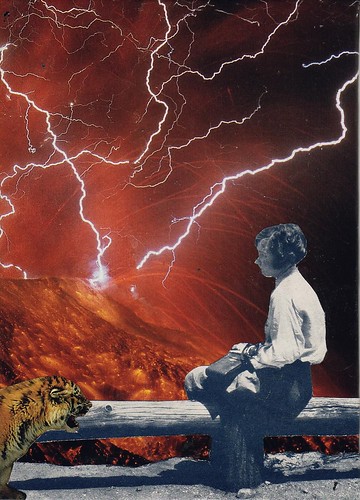
Zen Dixie: Dark yes, but not in the foreboding sense that seems to be pervasive in a lot of dream/mythos driven art.
What is it about collage that speaks to the part of you that creates and works within this personal mythos?
Tim Lukeman: You're right. Not necessarily an evil or negative darkness, but a mysterious & paradoxically revealing darkness.
I think it's the immediacy of collage. I seldom plan an image beforehand, although I'll occasionally have a rough notion of what I want to create -- but on the whole, I'll simply start sorting through clippings & images until something clicks on a very deep level, just feels right. In a way, it's like keeping a journal, simply puttiing down whatever comes to mind at that moment, then figuring out what it might mean later on (if possible).
Zen Dixie: Do you find that collages operate in the way dreams do, clipping bits here and there from what's around us to create their own narratives?
Tim Lukeman: I've been keeping a dream journal for most of the past 9 years, and collage is rather like letting dreams assemble themselves on the page before me, as if it's simply flowing out of me, though me, as it would through a medium. As in dreams, they take an eclectic mix of images, many of them mundane in their usual context, and create something vivid & startling in their juxtaposition. Needless to say, the Surrealists are great favorites of mine -- as are the English Romantics. This makes for a potent influence!
I've been more driven to create as I enter midlife, too -- a good deal more driven.
I've dabbled in painting, and would like to pursue it further; but I do seem to have a knack for collage.
Zen Dixie: What is the process like for you? Do you have an idea and look for pictures to match or are you more likely to do a bit of "visual archeaology" and create narratives from what you find?

Tim Lukeman: I'll often start with an interesting, evocative background, trying various clipped images against it. and once I've created one image that really seems to work, that in turn inspires similar images -- I'll find myself caught up in creating a series, almost as if telling a story, relatign some mythic narrative. Although it's usually a personal mythic narrative, one that reveals a great deal about me, to me.
Zen Dixie: Have you ever considered animation?
Tim Lukeman: I have! The idea fascinates me, and I'd love to try my hand at it. I'd like to try it.
Zen Dixie: What directions would you like your art to take? Also, where do you see your work going?
Tim Lukeman: You've probably noticed that the theme of The Descent shows up in quite a lot of my work, or The Threshold Between Worlds or Realities -- that is a constant for me. So if I could do a animated film, it would undoubtedly be along those lines. As many of my short-short stories are, as well. I also want to try a wordless novel or novella in collage, as well as a story mixing text & collage.
Zen Dixie: Have you ever wanted to redo and/or illustrate any of your books or covers?
Tim Lukeman: I wouldn't mind trying that now, to be honest! This would be a return to my childhood efforts of creating books from cover to cover, really. My first too books are horribly overwritten apprentice work, so I'd want to rewrite them as well; but it would be fun to create fitting covers for them. My only published book that I feel is strong, solid work, "Witchwood," actually had a cover I liked very much.
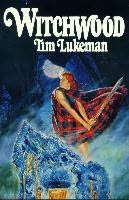
Zen Dixie: It is nice.
Tim Lukeman: I'm proud of that book. It's my first one with a female protagonist, by the way. Everything I've tried wriitng since then has had a female protagonist. Perhaps one day I might write the subsequent volumes, planned but never completed or even begun.
I have come to an interesting realization about my recent surge of creativity.
While I was driven to examine my life in depth after my brush with death in 2002, I didn't really become driven until just about a year ago. Looking back at my first completed series of collages, "Descending Mavis," I realize that I began them just two or three weeks after my father's death. And I've been busily making collage or writing short-short mythic stories ever since then. I think that made me far more aware of mortality and the preciousness of time, which is all too limited, more than my own should-have-been-fatal heart problems.
Zen Dixie: Some people have mentioned that dreams are a way for the mind to process out things we need to clear away the old stuff in our heads to make room for the new. Do you think that turning point might have created the same sort of process?
Tim Lukeman: Oh, I've no doubt of it! I'm definitely struggling to cope with loss, grief, awareness of time and mortality, and the need to live a more meaningful life now. I wonder if it's a mean of delving into those things safely, or a way of holding them at arm's length -- maybe a little of both?
I feel a greater need to create & leave behind something worthwhile now, to justify my life, perhaps to my father's memory? To justify it to myself? I'm really not sure.
Zen Dixie: Many of the titles of your collages seem like snippets of a narrative in progress.
Tim Lukeman: I do know that when I'm in the midst of creative work, whether it's writing or the visual arts, I'm in another world, somewhere outside of ordinary time.
One of my creative aspirations is to write a dreamlike narrative or epic poem of some sort; and I think the collage titles are a step in that direction.
Just like a musician fooling around with an instrument and idly shaping music, then having it begin to take shape & a life of its own, I write or collage in a sort of conversation with the work (which I suppose is with myself). I may have an firm idea of where I want it to go, and it'll have a very different idea. I trust my instincts then, going with what feels right, even if that leads into uncomfortable territory.
Zen Dixie: are there any pieces that speak to who you are as an artist? I know all of them speak of the moment, but I'm talking about works that continue to resonate in profound ways long after they're finished.
Tim Lukeman: Hmmm, that's difficult... but some of the Forest Spirits collages I've done, with a sense of unearthly stillness, a perception of some otherworldly power embodied in tangible form, glimpsed in passing within a wild wood. This is a feeling I've always had from early childhood: that there's something wondrous just around the corner, just over the hill, just out of sight -- and occasionally there's a guide to offer you a glimpse of it. "If the doors of perceptions were cleansed ..." as Wm. Blake put it.
I recall feeling as a very young child, not more than 4 or 5, that if I could reach out in just the right way, I could literally grasp the scene in front of me, and find that it was like a painted curtain or backdrop, something I could pull away, revealing the true nature of the Universe. That longing for transcendence again! My dreams often feature just such wise, beautiful Anima figures, showing me to doors, or pools of water, or windows -- entrances or passages to another, richer, more REAL world. But as the Surrealist poet Eluard once said, "There is another world, and it is this one." Hence my fascination with myth & religions, without a literal belief in any dogma or system -- all metaphors for what's going on inside, to my way of perception. Wm Blake again: "Thus men forgot that all deities reside in the human breast."
I have no system, no One True Way, to offer anyone else -- wouldn't dream of it! I only know that it works for me, that it's my ultimate narrative of meaning & existence -- to vanish when I do, no doubt. But no less meaningful while I'm alive. Which is what drives me to create, I guess. I'm making the images & legends of my inner universe tangible. And, if I'm lucky, some of what I create will resonate with others as well.
Zen Dixie: I know you've put some of your art online. Have you had a chance to show it yet? How do you feel about artists' collectives and critiques?
Tim Lukeman: At this point I haven't thought too much about showing it in a professional way. A bit intimidated, of course, unsure if it's good enough, or if I'm ready to deal with something like that. For the time being, sharing it with friends & whoever happens to stumble upon it at Flickr seems enough.
Zen Dixie: That first submission to a jury is always a huge step. Do you feel that the process by which you write and create art is still so very intertwined or do these use very separate parts of you?
Tim Lukeman: I think they are entwined. There's always a strong narrative aspect to my collages, and my writing is rich in vivid detail -- if you like, I can send you a short-short story as an example, or at least a few sample paragraphs. The few times I've tried painting, I don't start with much (if any) of a specific idea. I just start putting down a background and seeing what images emerge from it, then follow whatever appears.
Zen Dixie: This is more of a nuts and bolts question One thing that is a challenge for many people is finding time to create. It seems like there is a part of you that is always in that mode. Does this translate well to your schedule? are there times that are better than others or do you have a set work day as an artist?

Tim Lukeman: Ah, finding/making time to create! The smaller collages, using a minimum number of pieces, area lifesaver for me, I can fit them in during an hour, or even a half hour, stolen here or there. For writing, I might dash off a few lines while at work in an e-mail to myself. In both cases, if I've got something already there, some starting point, I can get a lot done in a short amount of time.
Short, simple creative exercises help a great deal. I've written about the 5-word-list poems we do: each of us comes up with a list of 5 words at random, sending them to one another; then we both make poems out of them, as quickly as possible, within the first 20-30 minutes of getting them.
My wife & I are happy that we cut our cable to the barest bones, and seldom use the TV except as a DVD player now. This frees up HOURS! We both agree that we need to consciously make or set aside creative time, or else it slips away before we know it.
Zen Dixie: I don't think people realize how much TV saps creative energy. Douglas Adams was the first person I'd ever encountered who wrote about what he listened to or had going in the background when he worked.
Tim Lukeman: I find that music helps me quite a bit. In the last few years, I've begun to immerse myself in jazz -- the classic 50s-60s period -- Miles Davis, Bill Evans, etc. Or, I'll put on some minimalist or ambient music. I also find that Medieval music is conducive to creation as well. But sometimes several albums by, say, the Beatles, or maybe My Bloody Valentine could be just the thing! I have eclectic tastes! I may believe I'm choosing the music at random, at idle whim; but once I begin working, I discover that it suits the mood for whatever unexpected creative piece is emerging.



2 comments:
You both of you create worlds I feel privileged to visit. My head may explode from the excitement of the two of yours getting together like this.
I'm trying to reach Tim Lukeman but have had very little luck finding direct contact information. If you have any, I'd really appreciate it because I'd like his permission to use one of his images on a book cover. Many thanks, Jennifer Fulford, blackbombbooks@gmail.com
Post a Comment